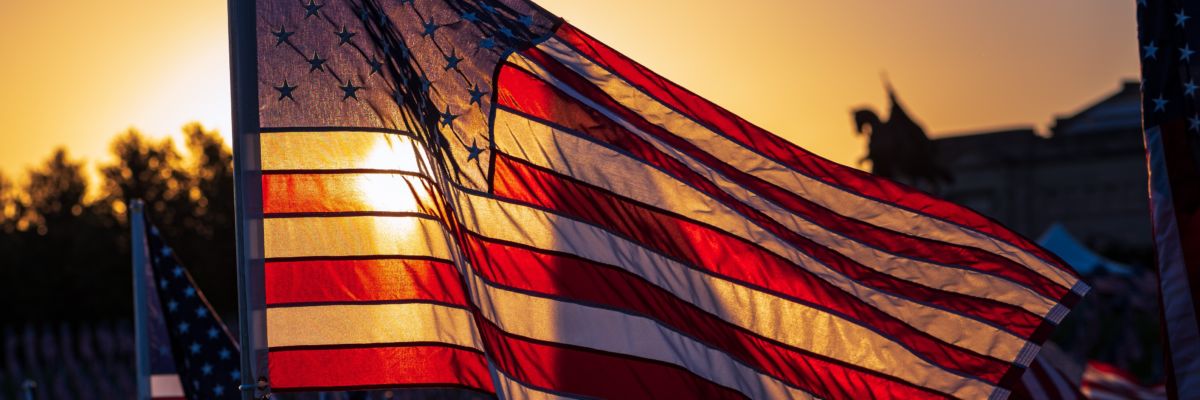
In the United States, we usually identify ideological differences as liberal or conservative, right or left, Democrat or Republican. The categories are helpful to some extent. Disciples of Jesus worship the Word made Flesh, “the way, the truth, and the life” (John 14:6). Thoughtful Christians prefer to distinguish between truth and error. So when we pledge our allegiance to the flag, we must pay close attention to the words for purposes of personal integrity.
A Union Army officer during the Civil War composed the first Pledge of Allegiance of the United States. Decades later, in 1892, Francis Bellamy penned the Pledge that is in use today. In 1942, Congress adopted it: “I pledge allegiance to the flag of the United States of America, and to the Republic for which it stands, one Nation indivisible, with liberty and justice for all.”
During the Cold War, the Knights of Columbus and veterans’ organizations called on Congress to add “under God” to the Pledge. When President Dwight D. Eisenhower attended a service in honor of Lincoln’s birthday, he heard the Presbyterian Rev. George Docherty sermonize: “To omit the words ‘under God’ in the Pledge of Allegiance is to omit the definitive factor in the American way of life.” He added, “An atheistic American is a contradiction in terms. If you deny the Christian ethic, you fall short of the American ideal of life.” On Flag Day in 1954, Congress—with Eisenhower’s signature—added the words “under God” to the Pledge.
What about today? Will the rapid and almost inevitable degradation of our culture and nation force us to renounce our beloved American flag and refuse formal expressions of patriotism? Have abortion, profiteering on aborted baby body parts, and institutional sexual perversion mortally wounded the country’s moral stature? Has the nation become the moral equivalent of the murderous Soviet Union, the Third Reich, Communist China, or North Korea?
In many respects, these questions are not new. Historically, could we honestly pledge allegiance to the flag that in effect 1) tolerated slavery; 2) waged the Mexican-American War, which President Grant considered the most unjust war in history; 3) racially segregated communities; and, especially for the last fifty years, 4) legally denies the humanity of unborn babies?
We must remember that good and evil permeate every social institution—families, communities, nations. And patriots have loved their countries, unconventionally when necessary, in even the most debased and barbarous nations, from Sophie Scholl in Nazi Germany to Vladimir Bukovsky in the USSR. Loyal Catholics, too, recite the Creed despite the faithlessness and treason of so many Church leaders.
So it comes down to this: even the worst of times cannot extinguish our obligation for patriotism, which struggles against national suicide.
Patriotism is a form of piety—the acknowledgment that we owe our gratitude to God, our family, and our nation for the gift of life and sustenance. We owe our lives to God, our parents, and to a country that provides the soil and cultural structures for communal living. Piety—and, deriving from it, patriotism—renders the affection and loyalty due to our benefactors. Patriotism is indispensable to our love of God and neighbor.
Just as we love our imperfect parents and follow the Fourth Commandment by lawfully obeying them, we can and should love and lawfully subject ourselves to our morally flawed nation, according to the dictates of conscience.
When President Ronald Reagan greeted Pope John Paul II in Miami in 1987, he said: “In freedom, we Americans have in these 200 years built a great country, a country of goodness and abundance. . . . It is precisely because we believe in freedom, because we respect the liberty of the individual in the economic as well as the political sphere, that we have achieved such prosperity.”
Pope John Paul II responded with a profound clarification: “The only true freedom, the only freedom that can truly satisfy, is the freedom to do what we ought as human beings created by God according to his plan. It is the freedom to live the truth of what we are and who we are before God, the truth of our identity as children of God, as brothers and sisters in common humanity. That is why Jesus Christ linked truth and freedom together, stating solemnly: ‘You will know the truth and the truth will set you free’” (John 8:32).
Back in 1954, in one providential phrase, Congress purified—and perhaps redeemed—the Pledge of Allegiance as an enduring expression of Christian patriotism. The recitation of the Pledge of Allegiance “renders unto Caesar the things that are Caesar’s” in patriotism, and it also “renders unto to God the things that are God’s” in Christian piety (see Mark 12:13-17). Regardless of how far we slip in the direction of injustice, lawlessness, totalitarianism, and even barbarism, our resolve to live under God is the gold standard of patriotism and is the remedy for all imperfections, past, present, and future.
During that same 1987 address to President Reagan, John Paul II concluded by quoting the Pledge of Allegiance: “A new birth of freedom is repeatedly necessary: freedom to exercise responsibility and generosity, freedom to meet the challenge of serving humanity, the freedom necessary to fulfill human destiny, the freedom to live by truth, to defend it against whatever distorts and manipulates it, the freedom to observe God’s law—which is the supreme standard of all human liberty—the freedom to live as children of God, secure and happy: the freedom to be America in that constitutional democracy which was conceived to be ‘one Nation under God, indivisible, with liberty and justice for all.’”
As it reads, a robust and sincere patriotic recitation of the Pledge does not undermine Christian integrity. Rather, it challenges the foundations of an atheistic woke culture.



